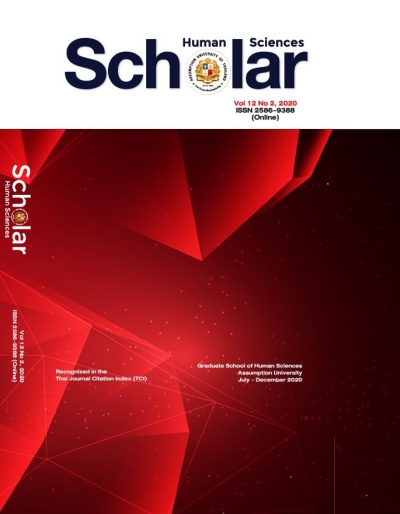Cross-Gender Students: Victims of “Rape Prank”
Keywords:
Cross-gender students, Sexual Stigma, Rape PrankAbstract
The purpose of this qualitative research is to study the types of bullying in cross-gender students, and a challenge that cross-gender students have to encounter. This research uses Feagin's (1963) and the concept power relations of Michel Foucault empirical influencing of Power on Stigma Theory was used as a framework. Data collection and analysis were performed by using a structured interview protocol. There were five interviewees who identified themselves as cross-gender (Ka-thoeys in Thai). In addition, they were students at a public school in Chiang Mai, Thailand. Non-participant observations were also used to collect the data by observing their social behavior in the school. The results showed that these cross-gender students were bullied in a form of “rape prank” or sexual forcing which embarrassed them in public by their friends and senior students every day. They felt the school was unsafe. Classrooms and restrooms tended to be the location where the cross-gender students were bullied the most. This bullying led to their depression disorder and suicide. This research helps to inform basic information about school regulations. Every schools should announce bully-free regulations and enforce them. Moreover, these regulations should support all genders. Bullies should be sentenced to punishment. In order to eliminate bully and abuse from schools, regulators should enforce the regulations and create a safe environment for students focusing those who identify themselves as cross-gender students.
References
Baanjomyoot. (2011). Cerebral Cortex cerebral cortex the outside of the big brain. Official Articles Education (Online). Available: https://www.baanjomyut.com/. (May 11, 2560).
BangkokBusiness. (2013). Social issues. Educational article. (Online). Available: http://www.bangkokbiznews.com. (May 11, 2560).
Crocker J, Major B, Steele C. (1998). Social stigma. In Handbook of Social Psychology, ed. S Fiske, D Gilbert, G Lindzey, vol. 2, pp. 504. Boston, MA: McGraw-Hill.
Feagin’s, J. (1963). Erving. Stigma: Note on the Management of Spoiled Identity. (Harmondsworth : Penguins Book, 1963), 121-122.
Foucault, M. (1978). The History of Sexuality Volume I: An Introduction. New York: Pantheon.
Foucault, M. (1995). Discipline and Punish: The Birth of the Prison. New York: Vintage Books.
Foucault, M. (2004). Abnormal: Lectures at the College de France, 1974-1975. London: Verso.
George Weinberg. (1960). Gay and Screw. Manhattan psychotherapist with a doctorate in clinical psychology from Columbia University.
Goffman, E. (1963). Stigma: Notes on the Management of Spoiled Identity. Englewood Cliffs, N.J.: Prentice-Hall.
Guadamu, T. (2013). Don't “bullied” me. Bangkok Media Business Company Limited. Bangkok, Thailand.
Herek, G. M. (2004). On heterosexual masculinity: Some psychical consequences of the social construction of gender and sexuality. American Behavioral Scientist, 29, 563–577.
Hillier, Frederick S. (2010). Introduction to operations research: Being bullied. Boston: McGraw-Hill Higher Education. Http://www.bugaboo.tv/news/. Hot News Online. Retrieved on April 1, 2560.
Jackson, P. A. (1999). Tolerant but unaccepting: The myth of a Thai “gay paradise.” In P. A. Jackson & N. M. Cook (Eds.), Genders and sexualities in modern Thailand. Chiang Mai, Thailand: Silkworm Books. pp. 226–242.
Kansriwien, S. (0nline). Universal human rights and the Universal Declaration of Human Rights. Accessible from http://www.baanjomyut.com (Date of Search: April 9, 2014).
KrangPibul, K. (2014). Bisexual degrees, ceremonies and dignity equality. Bisexual Network Thai Master Students Social Work Research Faculty of Social Science Thammasat University.
King, M., Winter, S., & Webster, B. (2009). Contact reduces trans prejudice: a study on attitudes towards transgenderism and transgender civil rights in Hong Kong. International Journal of Sexual Health, 21(1), 17–34.
Kongsakon, K. (2002). Production creates “masculinity” by the ruling class. Master of Sociology and Anthropology Thesis Anthropology Faculty of Sociology and Anthropology Thammasat University.
Kosciw, J. G. Greytak, E. A., Diaz, E. M., and Bartkiewicz, M. J. (2010). The 2009 National School Climate Survey: The experiences of lesbian, gay, bisexual and transgender youth in our nation’s schools. New York: GLSEN.
Leach, F. & Dunne, M. (2013). School-related gender-based violence. Paper presented at the Asia-Pacific Roundtable Meeting on School-Related Gender-Based Violence, November 2013, Bangkok, Thailand.
Nithiwirakun, N. (2014). Alternative Sex in Schools: Do We Accept True? Faculty of Education Chulalongkorn University.
Ojanen, T. T. (2009). Sexual/gender minorities in Thailand: Identities, challenges and voluntary-sector counseling. Sexuality Research & Social Policy, vol. 6, no. 2, pp. 4-34.
Olweus D, Limber S, Mihalic S. (2003). Bullying prevention program. Boulder, CO, University of Colorado, Center for the Study and Prevention of Violence. (Blueprints for Violence Prevention Series, Book9).
Pariwutti, A. (2010). Seminar on “brand identity: creating chains gay sexuality male homosexuals in the Thai media.” [Online URL : www.teen.Path.net.html] accessed on November 2559
Praekaao, P. (2013). Research Project on Gender Research and Training Center. Health and Wellness Khonkaen University Faculty of Nurse Khonkaen University.
Pinheiro, J.Q. (2006). World Report on Violence Against Children. Revue Européenne de Psychologie Appliquée. 56, 191-198.
Royal Dictionary. (1999). Department of the Royal Institute. Bangkok: Nanmee Book Publications.
Samosorn, K. (2013). The story of sexuality education. Health Promotion Program Sex (Thais).
Sopakoon, A. (2016). Gender, Acceptance, Change in the Present Era philosophy. Doctor of Philosophy Program in Curriculum and Instruction Faculty of Education Khonkaen University.
Supapueng, N. (2013). Documentation Workshop Powerful female power in political reform. Bangkok: Senate, Commission on Women, Youth and the Elderly.
Supawattanakun, N. (2018). Transgender: Traveling from the Third Sex to the Real Male World. Independent newspaper on Prachatai website. Bangkok, Thailand.
Tansawaswong, P. (2015). The concept, theory, methodology in the study of sexuality.
Documents of annual seminar on sexuality education in society. The 1. UNESCO. (2012). Education sector responses to homophobic bullying. Good policy and practice in HIV and health education: Booklet 8. Paris, France: UNESCO.Available at: http://unesdoc.unesco.org/images/0021/002164/216493e.pdf




